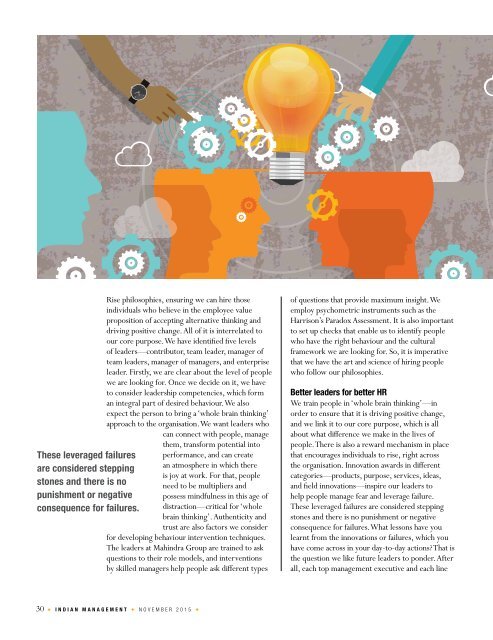the new hr
1NT8tPl
1NT8tPl
Create successful ePaper yourself
Turn your PDF publications into a flip-book with our unique Google optimized e-Paper software.
These leveraged failures<br />
are considered stepping<br />
stones and <strong>the</strong>re is no<br />
punishment or negative<br />
consequence for failures.<br />
Rise philosophies, ensuring we can hire those<br />
individuals who believe in <strong>the</strong> employee value<br />
proposition of accepting alternative thinking and<br />
driving positive change. All of it is interrelated to<br />
our core purpose. We have identified five levels<br />
of leaders—contributor, team leader, manager of<br />
team leaders, manager of managers, and enterprise<br />
leader. Firstly, we are clear about <strong>the</strong> level of people<br />
we are looking for. Once we decide on it, we have<br />
to consider leadership competencies, which form<br />
an integral part of desired behaviour. We also<br />
expect <strong>the</strong> person to bring a ‘whole brain thinking’<br />
approach to <strong>the</strong> organisation. We want leaders who<br />
can connect with people, manage<br />
<strong>the</strong>m, transform potential into<br />
performance, and can create<br />
an atmosphere in which <strong>the</strong>re<br />
is joy at work. For that, people<br />
need to be multipliers and<br />
possess mindfulness in this age of<br />
distraction—critical for ‘whole<br />
brain thinking’. Au<strong>the</strong>nticity and<br />
trust are also factors we consider<br />
for developing behaviour intervention techniques.<br />
The leaders at Mahindra Group are trained to ask<br />
questions to <strong>the</strong>ir role models, and interventions<br />
by skilled managers help people ask different types<br />
of questions that provide maximum insight. We<br />
employ psychometric instruments such as <strong>the</strong><br />
Harrison’s Paradox Assessment. It is also important<br />
to set up checks that enable us to identify people<br />
who have <strong>the</strong> right behaviour and <strong>the</strong> cultural<br />
framework we are looking for. So, it is imperative<br />
that we have <strong>the</strong> art and science of hiring people<br />
who follow our philosophies.<br />
Better leaders for better HR<br />
We train people in ‘whole brain thinking’—in<br />
order to ensure that it is driving positive change,<br />
and we link it to our core purpose, which is all<br />
about what difference we make in <strong>the</strong> lives of<br />
people. There is also a reward mechanism in place<br />
that encourages individuals to rise, right across<br />
<strong>the</strong> organisation. Innovation awards in different<br />
categories—products, purpose, services, ideas,<br />
and field innovations—inspire our leaders to<br />
help people manage fear and leverage failure.<br />
These leveraged failures are considered stepping<br />
stones and <strong>the</strong>re is no punishment or negative<br />
consequence for failures. What lessons have you<br />
learnt from <strong>the</strong> innovations or failures, which you<br />
have come across in your day-to-day actions? That is<br />
<strong>the</strong> question we like future leaders to ponder. After<br />
all, each top management executive and each line<br />
30 INDIAN MANAGEMENT NOVEMBER 2015


